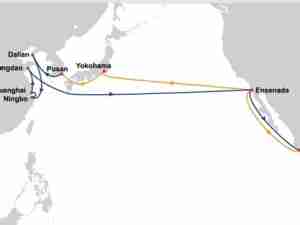Maersk to hand $6.6 billion to investors after selling Danske stake
By: Reuters | Feb 25 2015 at 08:29 AM | Liner Shipping
Danish shipping and oil group A.P. Moller-Maersk will hand shareholders a $6.6 billion windfall in dividends this year after it sells its 20 percent stake in Denmark’s biggest bank Danske.
Analysts had expected Maersk to announce the divestment of some assets on Wednesday as part of its strategy of focusing on its core shipping and oil divisions - but the Danske Bank stake had not been among the anticipated sales.
Maersk - the world’s largest container shipping company - said it would sell 15 percent to its controlling shareholder, the Moller family foundation, saying the deal ensured Danske remained in Danish hands and had a long-term major investor.
It will offer the remaining 5 percent to other existing Maersk shareholders, it added.
The conglomerate did not specify how much the foundation was paying for the 15 percent Danske stake, but said it would correspond to $5.5 billion.
That $5.5 billion will go to shareholders at about 1,569 crowns a share, Maersk said, and it also proposed dividends of $1.1 billion for the 2014 business year, or 300 a share.
Maersk’s shares jumped by more than 8 percent to top 15,000 crowns, close to a record high of 15,070 crowns hit last September after Maersk announced its first share buyback programme and analysts upgraded their price targets.
“You’ll have a more streamlined conglomerate as an investment case,” said Alm. Brand analyst Jesper Christensen.
“They no longer have capital stashed in a bank and this will be looked upon positively, especially for the many foreign investors - for example from the U.S. - thinking ‘I want to invest in shipping, so why should I invest in a Danish bank?’.”
Ana Uggle, the granddaughter of Maersk’s founder and head of the foundation, told Reuters: “It is to ensure the long-term ownership of Danske Bank and ensure the bank’s roots in Danish society.”
‘VOLATILE BUSINESS’
In recent years, Maersk has sold off assets such as stakes in supermarkets and Danish shipping company DFDS as well as fleets of Liquefied Natural Gas (LNG) and crude oil tankers and oil production vessels.
The Danske stake sell is immensely positive and will help reduce a discount on Maersk shares that exists because the company is a conglomerate, said Jesper Langmack, head of equity investments at PFA, a pension fund that is the largest Maersk shareholder aside from the foundation that controls it.
“If they judge that it’s non-core for their business, then I think its reasonable enough (that they continue selling non-core assets), but they’ve already sold off a lot of non-core, so they’re close to their goal. There’s not much non-core left,” he told Reuters.
The Danske announcement was made as Maersk published 2014 results broadly in line with analyst expectations from a Reuters poll. Net revenue was largely flat at $47.57 billion and net profit was up 37 percent to $5.2 billion - boosted by the sale of its stake in Danske Supermarked Group.
It booked $2.2 billion, or $1.9 billion after tax, in impairment losses at its oil unit. Most of that was a $1.7 billion writedown announced last year on the value of its Brazilian assets, the rest involved the value of its British assets after oil prices slumped in the second half of 2014.
It expects group underlying profit to fall to “slightly below” $4 billion this year from $4.1 billion in 2014.
But it expects underlying profit at its container shipping unit Maersk Line to be above the $2.2 billion in 2014. The business, often seen as a bellwether for global trade, has been struggling with low freight rates along with its peers.
“It’s a very volatile business, so when Maersk says it expects progress it’s a positive announcement,” said Frans Hoyer, analyst at Jyske Bank.





